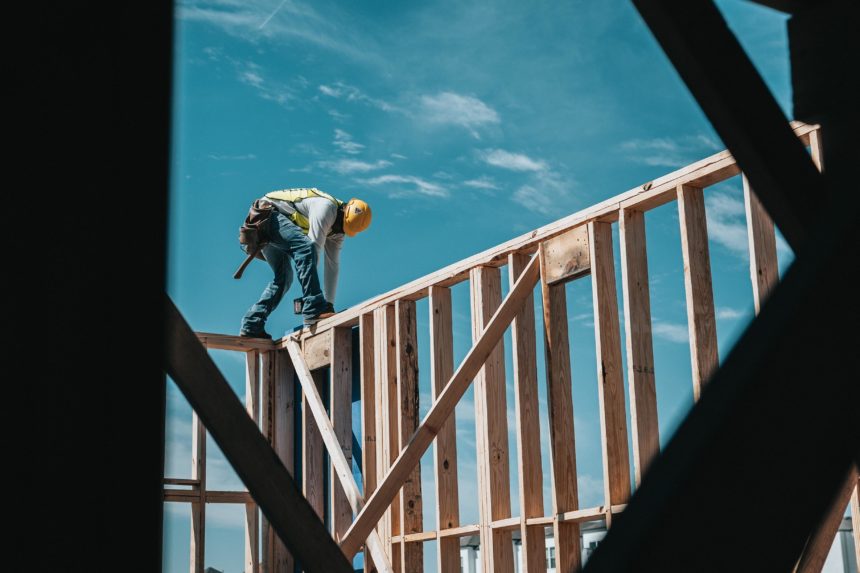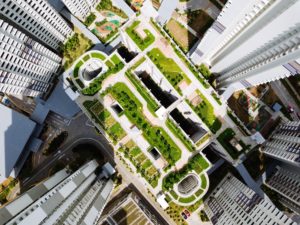Mission Focus: Construction and Building Operations

Zinc’s next mission is to transform the industries that have the most impact on our environmental crisis. In our Mission Manifesto, we outline the four sectors that we see as key areas where transformational impact can be driven. Read on to learn more about one of these key sectors: Construction and building operations.
We know we cannot tackle the climate and biodiversity crises without transforming the way we design, construct and operate buildings.
Today, the material and construction processes across a building’s lifecycle, as well as the energy used to operate buildings, together account for around 30% of global greenhouse gas (GHG) emissions. Moreover, by 2050 the UN predicts that two-thirds of the world’s population will live in cities. Urgent action is needed in these sectors in order to allow them to meet the current and future needs of people and our changing planet.
In this blog, we explore the large-scale opportunities for innovation in the construction and Building operations sector – and how entrepreneurialism can lead the transformation in this sector.
Why is innovation needed in the construction and building operations sector?
Accelerated action is clearly required to help this industry reduce emissions, pollution and harm to our natural ecosystems, and design and build our cities to be more resilient to climate change. Without transformation, the negative environmental impacts of this industry are only set to increase to match the needs of our rapidly growing urban population, especially in emerging market countries – as 1.5 million people are added to the global urban population every week. This concentration and interconnection of people, infrastructure and assets across urban areas will also amplify the impacts of climate hazards, such as record heatwaves, floods, droughts and storms, that in many countries are now unavoidable, and predicted to become increasingly frequent and intense.
Transformative action is within the industry’s reach. The IPCC recently highlighted that up to 61% of building emissions could be reduced by 2050 with technologies available today, if there is rapid acceleration this current decade in the technical capacity, skills and labour across the building and construction industry. Architects and designers are also rapidly adopting new ways to increase biodiversity and reduce the impacts of climate change, such as creating white and green roofs, and flood-resilient environments.

How can entrepreneurship lead innovation in this sector?
This moment is being described as the ‘retrofit’ or ‘green building revolution’, with trillions of dollars of new infrastructure investment expected to flow into cities across the globe in the coming years to help tackle this crisis.
There are still untapped opportunities, harnessing the power of technology to build solutions that reduce emissions, pollution and harm to our natural ecosystems. The exciting possibilities of introducing deep-tech, AI, machine learning or robotics to optimise areas in the industry such as urban planning, construction processes, heating & cooling systems and the recycling of materials and buildings.
At Zinc, we want to be a part of this revolution. That’s why we are supporting people to build new B2B businesses from scratch to help transform the construction and building industry – by offering up to £250k in funding and a 12-month support programme for people who want to become mission-driven entrepreneurs and build a commercial business from scratch.
Ready to innovate in this sector? Apply today
What is the Zinc Venture Builder?
The Zinc Venture Builder is a platform for entrepreneurial individuals to build their own venture-scale businesses with the support of a tried and tested method. We have run our Venture Builder 4 times previously and since 2017 have supported over 200 people to become Founders. Want to learn more? Visit our Venture Builder page to learn more.
The Zinc Venture Builder takes 70 individuals each cohort and offers up to £250,000 in investment, tailored support across 12 months, a specialist Fellows network with established expertise and much more.
Do you know someone working in construction, building management, architecture, or design? Or people with engineering, urban planning or technological expertise that want to make a difference in this industry? Help spread the world by sharing the mission manifesto with them, encourage them to sign up to a meet and greet, or click here to apply.
Join the Zinc community
Stay up to date with all Zinc updates and future posts as part of our fast growing community.
Featured Resources
Impact Report 2023
We started Zinc with the hypothesis that missions are an effective way to attract highly ambitious, talented and experienced groups of innovators, who might not recognise themselves as “classic entrepreneurs” but are ready and able to start a new commercial and successful venture to tackle some of our most pressing societal issues.
The world has overcome the sorts of challenges we face today when it has adopted a mission-based approach to the biggest problems and brought together world-class talent to invent and innovate, e.g: NASA and landing a man on the moon, the LSE blueprinting the British welfare state, or the Gates Foundation aiming to eradicate diseases.
On this basis and assumption, we designed Zinc as a new mission-based Venture Builder — a place where global talent, ‘impact makers’, can join to experiment and develop new solutions to our most pressing societal issues.
To Eliminate Environmental Threats to Our Health
Environmental health threats pose a grave danger to human health and well-being, causing suffering to individuals and communities worldwide. These threats, which include chemical pollution, climate change, and biological hazards, cause acute and chronic diseases and exacerbate existing health conditions.
To protect those we care about, we must tackle the causes of environmental degradation, shield people from the consequences of environmental harm, and, where protection fails, we must mitigate the health impacts they suffer.
This demands action to improve all aspects of our environment: soil, food, air, water, and the built environment. It requires us to focus on every aspect of human health to reduce suffering.
Entrepreneurship and technology are powerful means to tackle these challenges. That’s why we are backing 70 founders to build innovative companies addressing this mission.


